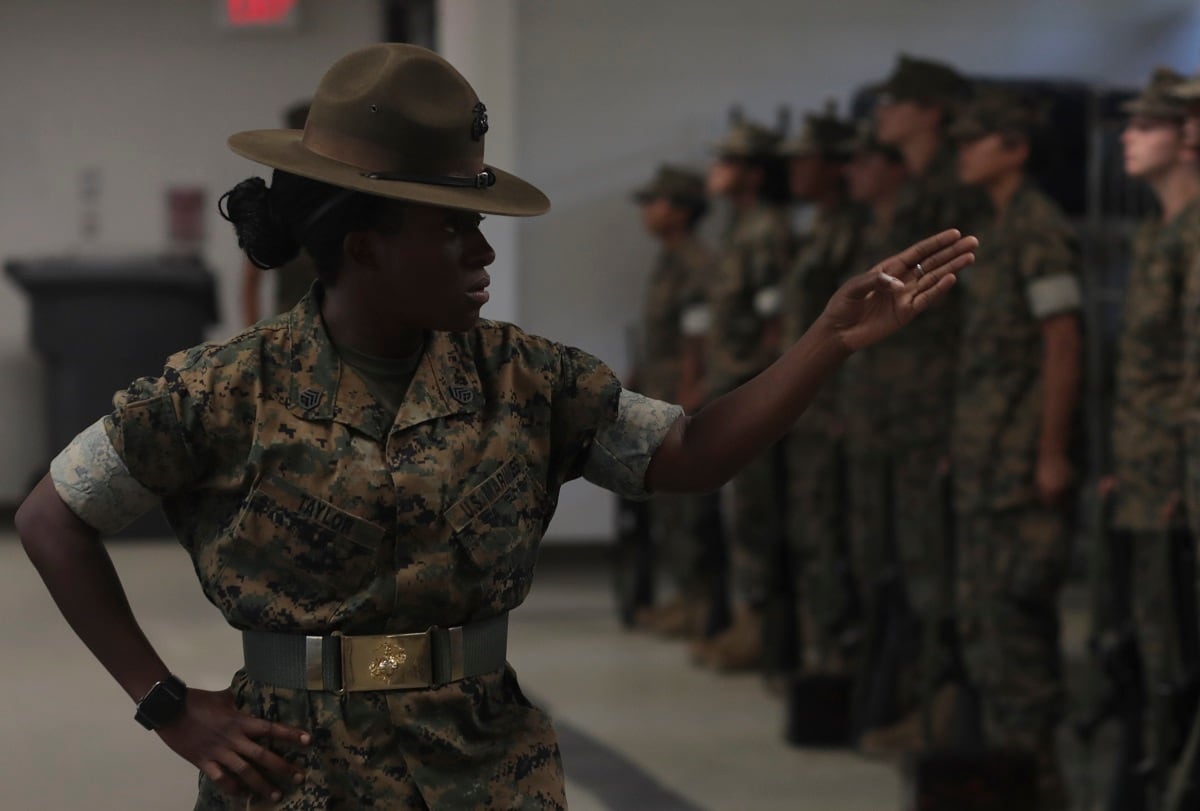The Marine Corps disabled comments on two tweets about the history-making recruits and Marines who are part of the first platoon of women to be trained at Marine Corps Recruit Depot San Diego.
The Corps’ initially said the it was “testing out“ a new feature on Twitter.
But the decision drew criticism that it showed a lack of support for the women making history, and even brought into question whether the service was infringing on First Amendment rights.
On Friday the Marine Corps gave an exclusive interview to Marine Corps Times, defending the legality of the decision and describing it as one meant to protect Marines from misogynistic social media hate.
“We have found that when we post content about women, we attract comments from a community that doesn’t think women have any place in service to our nation,” Headquarters Marine Corps spokesman Capt. Joseph Butterfield told Marine Corps Times in a Friday phone interview explaining the decision to disable the comments. “These are recruits, and if there’s the potential that they’re welcomed to the Marine Corps when they get back in the real world by a former Marine saying ‘you don’t belong here’ then that is our interest.”
RELATED

Butterfield said more often than not the hate-filled comments come from veterans who no longer have a stake in the changes being implemented to increase gender-integration in the force.
The issue is not necessarily disagreeing with specific policies about integration, the Marine added. But rather the comments that seek to degrade women in the Marine Corps.
“You can’t have it both ways if you want to continue to associate yourself with the Marine Corps post service, then you still need to represent our core values online and offline.”
Online trolls
Hateful comments on official Marine Corps posts about women or lesbian, gay, bisexual, and transgender Marines are not unusual.
In 2020 during Pride Month the Marine Corps Recruit Depot Parris Island, South Carolina, Facebook page posted a picture celebrating and recognizing, “our LGBT service members.”
The replies to the post saw several comments questioning why the Marine Corps cared about diversity and questioning whether gay, lesbian, bisexual or transgender Marines even had a place in the Corps.
In response Chief Warrant Officer Bobby Yarbrough, a communications officer at the recruit depot, defended the Corps, showing support for LGBT Marines and the Corps’ mission of increased diversity.
“It always takes courage to confront a bully and no one knows that better than a Marine,” Imran Ahmed, the CEO of the Center for Countering Digital Hate, told Marine Corps Times Friday.
Some have called for the Marine Corps to learn from the warrant officer and lead by example in standing up online for Marines who routinely receive hate online, simply for their gender, sexuality or race.
Though Ahmed applauded Yarbrough’s move, he said the Marine Corps’ decision to disable comments may be the best way to defeat the trolls.
“Trolling is purposeful behavior, it is designed to take advantage of the fact that when people use abusive language, other people either react very positively or negatively and then amplify that hate into millions of timelines,” he said.
The amplification of hate is aided by the Twitter algorithm that promotes posts that receive a high level of interaction and would take an enormous amount of resources to counter, Ahmed added.
Butterfield said repeating Yarbrough’s strategy to meet hateful online comments with unflinching adherence to the Marine Corps’ values and orders is simply not possible to scale up given the Marine Corps’ resources.
“We don’t have the manpower within the COMMSTRAT community to police all of social media,” Butterfield said.
The strategy of disabling comments and cut the Twitter trolls off from their food source is one way the Marine Corps is trying to make up for their lack of manpower.
Ahmed said though disabling comments was a smart way to starve the trolls, it was also admitting a societal failure.
“They’re acknowledging that we lost the battle now, against social media companies and their algorithms,” he said.
The legality
But disabling comments on social media raises a question on what government accounts can legally do on social media platforms.
Katie Fallow, a senior staffer with the Knight First Amendment Institute at Columbia University in New York, said disabling comments on Twitter is less clear cut of a First Amendment violation than when the Army and Navy esports teams blocked users.
“This is a harder First Amendment question than the one presented when public officials block critics from commenting on their official social media accounts,” Fallow said.
“We are comfortable with the legalities of it,” Butterfield said about disabling Twitter comments.
He noted that users were still able to “quote tweet” ― or re-tweet the post on their own page with the own commentary.
For those who still felt their voice was diminished, he encouraged them to email the Headquarters Marine Corps press office at ontherecord@usmc.mil, to discuss the policy changes they object to.
Butterfield said the Corps does not have a set policy in place on when it will disable comments on posts in the future.
“The fact that we consistently see that whenever we post content about female Marines, we continue to see hateful comments shows that we still need to experiment with how we approach this topic online,” the spokesman said.
In the interview Butterfield called on Marines and veterans to stop making hateful comments online about the Marine Corps and to correct others whenever they see it.
“A multifaceted approach is required, that includes current Marines stepping in and defending Marines online, with former Marines doing the same thing,” Butterfield said.





